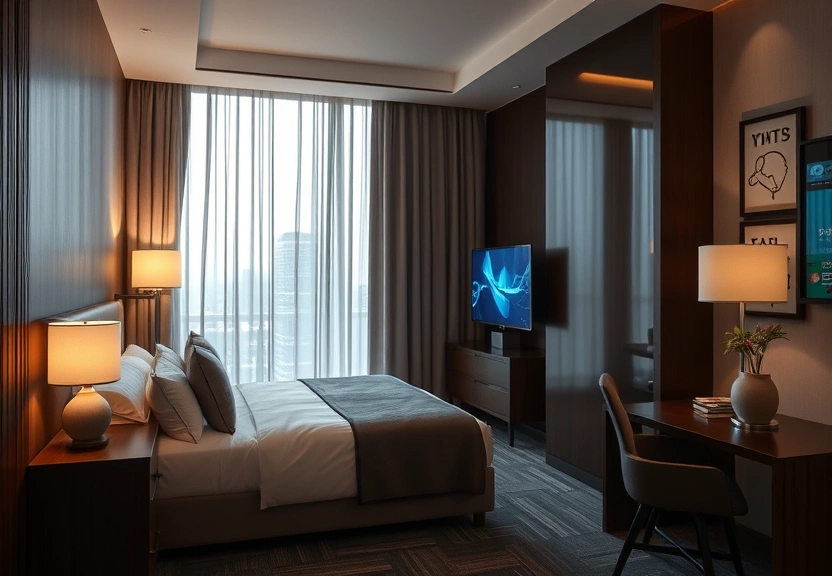Unlocking Savings: Hotels Spend 75% of IT Budgets on Outdated Tech—Here’s How to Change That
In a fast-evolving hospitality landscape, the need for efficient and innovative hotel technology has never been more pressing. According to an industry analysis from Hotel Technology News, a staggering 75% of IT budgets across hotels are consumed by outdated systems. This misallocation not only hampers operational efficiency but also stifles growth and innovation. As the hospitality industry continues to recover and adapt post-pandemic, understanding the implications of outdated hotel technology and implementing strategic changes is essential for unlocking significant cost savings.

This article delves into the current state of hotel technology, the financial impact of relying on outdated systems, and actionable strategies for hoteliers looking to revamp their IT approach. From embracing cloud-based solutions to prioritizing guest experience through technology, we will explore how hotels can redirect their IT budgets towards more effective and modern solutions, ultimately leading to enhanced profitability.
The Current State of Hotel Technology
Understanding the current landscape of hotel technology is crucial for hoteliers aiming to maximize their IT budgets. The hospitality sector has traditionally lagged behind other industries in adopting cutting-edge technology. Many hotels still rely on legacy systems that were implemented decades ago, which can lead to a myriad of challenges.
Legacy Systems and Their Drawbacks
Legacy systems are outdated software or hardware that may still function but do not meet modern standards for efficiency and integration. These systems often come with significant drawbacks, including:
- High Maintenance Costs: Keeping outdated systems operational can require costly repairs and updates.
- Lack of Integration: Legacy systems often cannot communicate with new software, leading to data silos and inefficiencies.
- Inability to Scale: As hotels grow or change, outdated systems can hinder expansion or adaptation to market demands.
- Poor Guest Experience: Outdated technology can lead to slower service, frustrating guests and impacting their overall experience.
The Financial Impact of Outdated Systems
The financial strain of maintaining outdated hotel technology is evident in the disproportionate allocation of IT budgets. With 75% of these budgets locked into legacy systems, hotels are left with limited resources for innovation. This section explores the financial implications in detail.
Cost of Maintenance vs. Investment in Innovation
When hotels allocate the majority of their IT budgets to maintaining outdated systems, they often miss opportunities to invest in innovative technologies that could yield far greater returns. The cost of maintaining these systems can include:
- Frequent Repairs: Increased downtime and the need for specialized IT support can significantly inflate costs.
- Training Costs: Staff may require additional training to operate older systems effectively, diverting resources from other areas.
- Lost Revenue Opportunities: Outdated systems can hinder marketing efforts, leading to missed revenue from potential guests.
Opportunity Cost of Innovation
When funds are tied up in outdated systems, hotels forfeit the opportunity to invest in technologies that enhance guest experiences, improve operational efficiency, and streamline processes. This opportunity cost can have long-term consequences as competitors adopt more modern solutions, leaving lagging hotels behind.
How Hotels Can Change Their Tech Landscape
Transitioning from outdated systems to modern technology requires a strategic approach. Here are actionable steps hotels can take to optimize their IT budgets and enhance their technological capabilities.
1. Conduct a Technology Audit
The first step in revamping hotel technology is to conduct a thorough audit of existing systems. This audit should assess how much each system costs to maintain, its efficiency, and its impact on guest experience. By identifying underperforming systems, hotels can prioritize which technologies need replacement or upgrading.
2. Embrace Cloud-Based Solutions
Cloud-based hotel management systems offer numerous advantages over legacy systems, including:
- Scalability: Cloud solutions can grow with the hotel, allowing for easy adjustments as the business expands.
- Cost-Effectiveness: Many cloud services operate on a subscription basis, reducing upfront costs for hotels.
- Data Accessibility: Cloud systems provide real-time data access, which is crucial for informed decision-making.
3. Invest in Staff Training
Even the most advanced technology cannot deliver results without a well-trained staff. Investing in comprehensive training programs ensures that employees are equipped to leverage new systems effectively, enhancing operational efficiency and guest satisfaction.
4. Focus on Guest Experience
Modern guests expect a seamless experience from their hotel stay, and technology plays a key role in meeting these expectations. Hotels should invest in:
- Mobile Check-In/Out: Streamlining the arrival and departure processes improves guest satisfaction.
- Personalized Services: Data analytics can be used to tailor services to individual guest preferences.
- Smart Room Technology: Features such as smart thermostats and lighting can enhance the guest experience and improve energy efficiency.
Case Studies: Successful Transformations
Several hotels have successfully transformed their technology landscape, leading to significant cost savings and enhanced guest experiences. Here are a few noteworthy examples:
Case Study 1: The XYZ Hotel Group
The XYZ Hotel Group conducted a comprehensive technology audit that revealed that 80% of its IT budget was tied up in outdated systems. By switching to a cloud-based property management system (PMS), they reduced their IT costs by 30% within the first year. The new PMS allowed for improved data integration and enhanced guest personalization, leading to a 20% increase in customer satisfaction scores.
Case Study 2: ABC Resorts
ABC Resorts invested in smart room technology, allowing guests to control room settings from their mobile devices. This innovation not only improved guest experience but also resulted in a 15% reduction in energy costs. The investment in technology paid off quickly, with positive guest feedback driving increased bookings.
Frequently Asked Questions (FAQs)
1. Why are hotels still using outdated technology?
Many hotels continue to use outdated technology due to the high costs associated with upgrading systems and the fear of disrupting operations during the transition process.
2. How can hotels measure the effectiveness of new technology?
Hotels can measure the effectiveness of new technology through key performance indicators (KPIs) such as guest satisfaction scores, operational efficiency metrics, and revenue growth.
3. What are the risks of not upgrading hotel technology?
Failing to upgrade hotel technology can lead to increased operational costs, decreased guest satisfaction, and ultimately, a loss of competitive advantage in the market.
4. Are cloud-based solutions secure for hotels?
Yes, reputable cloud-based solutions typically offer robust security measures, including data encryption and secure access controls, making them a safe choice for hotels.
5. How can hotels prioritize their technology investments?
Hotels should prioritize technology investments based on guest impact, potential cost savings, and alignment with overall business goals. Conducting an audit can help identify key areas for improvement.
Conclusion
As the hospitality industry continues to navigate a rapidly changing environment, the importance of modernizing hotel technology cannot be overstated. With 75% of IT budgets currently allocated to outdated systems, hoteliers have a critical opportunity to unlock significant cost savings by embracing innovative solutions. By conducting technology audits, investing in staff training, and focusing on enhancing guest experiences, hotels can transform their operational efficiency and ultimately improve profitability. The time to change is now—modern hotel technology is not just a luxury, but a necessity for success in today’s competitive landscape.
📰 Original Source
Este artigo foi baseado em informações de: https://www.prnewswire.com/news-releases/hotels-are-draining-up-to-75-of-their-it-budget-on-legacy-tech-new-report-reveals-what-operators-can-do-302478018.html
